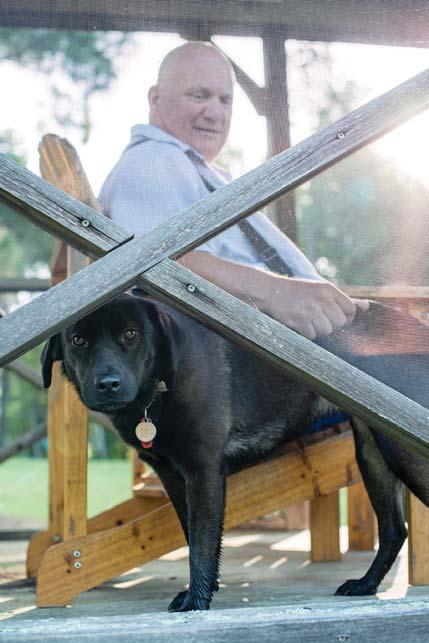
15 minute read
WALTER event
WALTER
EVENTS
Advertisement







CELEBRATING WOMEN AND ENTREPRENEURSHIP


Stellar lineup for third annual evening






Five remarkable local women will headline WINnovation 2017, WALTER’s third annual celebration of women and innovation, sponsored by Bank of America and Th e Umstead Hotel & Spa. An evening of inspiration, education, celebration, and fellowship will bring together innovators fr om the worlds of jazz, fashion, real estate, the environment, and consumer products. Th ey will share TED-style “WIN” (women in innovation) talks on the challenges and triumphs of their individual creative journeys, and the wisdom they’ve earned along the way. WINnovation 2017 will take place at the Umstead Hotel Sept. 8 with a cocktail hour, three-course gourmet dinner with wine pairings, WIN talks, and panel discussions. A pre-cocktail startup session sponsored by Diamonds Direct will also provide an opportunity for interested attendees to network and learn fr om other local entrepreneurial leaders. Th is event sold out in 2015 and 2016. WALTER hopes to see you there this year!


celebrating women and innovation


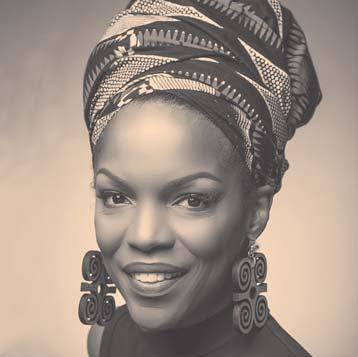
Each speaker will give a 5-minute TED-talk-style “WIN” talk about her own individual entrepreneurial journey.
WINnovation 2017
An evening of inspiration, education, and community Presented by Bank of America, The Umstead Hotel & Spa, and WALTER at The Umstead, 100 Woodland Pond Drive, Cary 4 p.m.: Startup workshop sponsored by Diamonds Direct 5 p.m.: Cocktails 6 p.m.: Dinner and program Tickets: $115, available at waltermagazine.com
SPEAKERS
Nnenna Freelon, Emmy-awardwinning jazz singer; non-profi t founder
Sarah Yarborough, Co-founder and CEO, Raleigh Denim Donna Preiss, Founder and CEO, The Preiss Company Alice Hinman, Founder, Apiopolis Tatiana Birgisson, Founder, Mati Energy
NNENNA FREELON
Nnenna Freelon is a world-renowned, six-time Emmy award winning jazz musician. She is also an educator, actor, philanthropist, nonprofi t founder, wife, and mother. In each of those roles, the Durham resident is an innovator, bringing creativity and originality to her art, her philanthropy, and her relationships. “Th ere are two themes running through my life,” Freelon said one recent morning. “One is dynamic creative partnerships and how they play out, whether that’s in your band, or marriage, or as a mother.” Another theme, she says, is “our challenge right now to live in this moment, to stay in this moment, to thrive in this moment.” Freelon’s moment includes her husband’s recent diagnosis with ALS. He is Phil Freelon, the celebrated architect whose Smithsonian National Museum of Afr ican-American History and Culture opened to international acclaim last year. (He was also the subject of Walter’s cover profi le in June). Together, the Freelons have founded the Freelon ALS Fund to raise money for ALS research. “We are engaging in ways to thrive,” Nnenna Freelon says. “We are living this moment. How do you do that when things are going well, and you’ve got your health, and what you think is an unlimited amount of time? You live in accordance with that. And then when things shift , you still have to live.” Th e work of the foundation is central to their lives, she says. It’s interesting to note “how your values, your estimation of what’s most important now keeps changing. Th ings that were so important to me 20 years ago are not important now. I was career-minded, I wanted to make my mark as a woman, as a human being. I wanted to win a Grammy. Th ey were goals that had to do with stature in the world, and there’s nothing wrong with that.” Today, though, Freelon says, “Th e idea of legacy is coming. What do I want to leave? Now I’m sort of seeing the other side of the mountain: What do I want my life to stand for?”
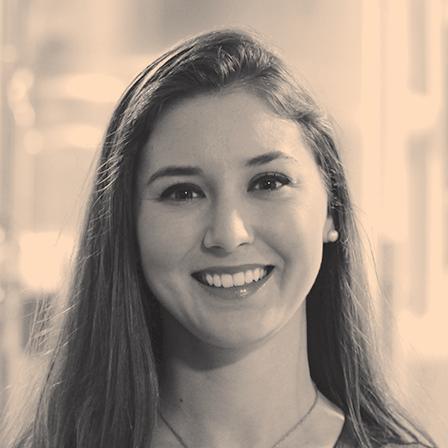
SARAH YARBOROUGH
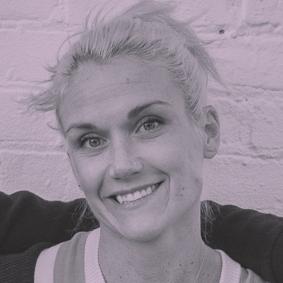
CO-FOUNDER AND CEO, RALEIGH DENIM Sarah Yarborough is the co-founder and CEO of
Raleigh Denim. She and her husband, Victor Lytvinenko, started making jeans together when she was an undergraduate in 2007, working on her collection for N.C. State
College of Design’s Art2Wear show. Today, Raleigh Denim sells jeans and other designs at prestigious stores like Barneys New York in 14 states; and Sarah and Victor are members of the Council of
Fashion Designers of America. “Some of the winningest ideas come from not winning,” Yarborough said recently, when asked to reflect on her company’s success.
“The struggle or challenge behind the curtain – that is so very different,” she says, from the public’s perception of of what success looks like.
It’s in those hidden struggles that breakthroughs emerge. Yarborough grew up in
Raleigh and attended Saint
Mary’s School before heading to New York City and
NYU, where she studied art, English, and philosophy.
She returned to Raleigh to continue her studies at N.C.
State, where her love of design blossomed. Yarborough remembers well the moment when Barneys New York called to order the jeans she and Lytvinenko had been tinkering with. “I’d been making jeans for Victor to wear around, and for some friends,” she recalls, “and the morning news got wind of it. They did a 60-second segment at 6 a.m.” A Durham shoemaker saw the piece, told a buyer for Barneys about the couple and their work, and the phone rang. The New York store ordered 114 pairs of their jeans, and Raleigh Denim was launched. These days, demand regularly outstrips supply. “We’re beyond capacity,” Yarborough says. “We are about to turn away business. And we’re also looking at supplemental production.” About a year ago, the company’s growth had the couple reconsidering its organization and their individual roles. Now, Yarborough serves officially as CEO, while Lytvinenko focuses more on sales, growth, and brand ambassadorship. “That’s been really wonderful,” Yarborough says. “It makes me feel more invested and really proud of the company that we’re building.” Tatiana Birgisson is the founder of Mati Energy, the healthy energy drink she created in her Duke dorm room five years ago. Today, a new 30,000 square-foot manufacturing facility in Clayton has her brewing as many as one million cans a month for sale at Whole Foods Market and other retailers in 12 states across the Southeast and beyond. She made Forbes magazine’s list of “30 Under 30” in the Food and Drink category this year – unsurprising, perhaps, for a business growing more than 100 percent a year. So what she says she wants to talk about at WINnovation might come as a surprise: “My story really starts with depression,” she says, “and my story is about the mental skill set that I gained to overcome depression.” She did it with perseverance, grit, and focus – not unlike the way she’s built her company, which focuses on health and well-being. “Even though life deals you a tough card, you can become a much stronger person,” she says. As Mati also goes from strength to strength, producing more than 100,000 cans a month of her proprietary combinations of tea and juice for an ever-expanding customer base, Birgisson’s hard-earned success has also resulted in wisdom worth sharing.
TATIANA BIRGISSON
FOUNDER, MATI ENERGY
ALICE HINMAN
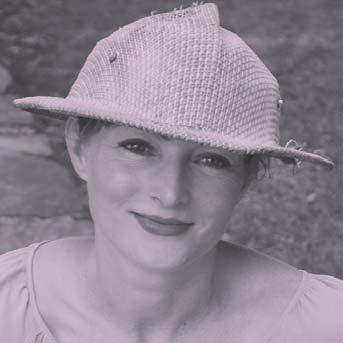
FOUNDER, APIOPOLIS
Alice Hinman is founder of the nonprofit urban bee sanctuary Apiopolis, taking care of as many as 6 million bees in 60 colonies all over Raleigh. The pollinators play a vital role in sustaining our local ecosystem, and Hinman’s working to make sure they have the environment they need to thrive. She’s doing that through Apiopolis’s day-to-day work, and by acting as an advocate, pushing to have Raleigh certified by the official “Bee City USA” program. Cities and towns who are certified commit to creating and sustaining pollinator habitats, raise awareness of the need for pollinators, and carefully manage pesticides. When the Capital Boulevard entrance to downtown is rebuilt, for instance, Hinman will lobby for the planting of “a functioning, beneficial landscape” surrounding it. Most people do not think of urban settings when they think of bees or ecosystems. Hinman says the city offers its challenges, but it also has benefits. Bees in cities actually can fare better than those in rural areas, she says, because cities have diverse nectar sources like potted plants and colorful flowers, while agricultural areas that are cultivated with only a few crops may leave bees struggling for nectar. Working with bees in the city is “quite different from their idyllic rural environment,” she says, “but I think we can affect positive change wherever we are.” With eight hives in her own yard in northeast Raleigh, Hinman also has a community of neighbors who appreciate her work and have embraced her use of an empty lot to keep even more colonies nearby. And she works as a beekeeper for hire, tending to bees beyond her own, and beyond Apiopolis’ downtown fleet. Hinman’s passion and her work are one, something she feels immensely grateful for. At WINnovation, Hinman says she’ll talk about “what led up to this, how my childhood, my background, has informed this, how different points in my life have become integral. Everything, if you let it, is a learning experience.”
DONNA PREISS
FOUNDER AND CEO, THE PREISS COMPANY
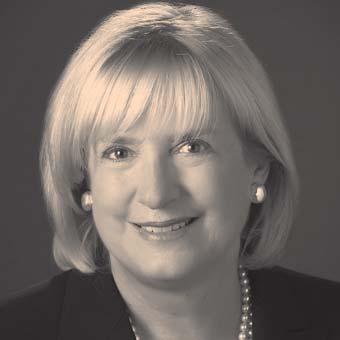
Donna Preiss is the founder and chief executive officer of Raleigh-based The Preiss Company, one of the nation’s top 10 providers of student housing, and the largest woman-owned owner and operator of student housing. She and the company are credited with leading the transformation of American college dorm life. Not long ago, if you were a college student, you most likely shared a cramped dorm room with a roommate or two, walked down the hall to the bathroom, drank stale coffee in the campus cafeteria, and hauled your laundry down to the basement to wash, quarter by quarter. Things have changed. If you are a college student today – thanks in no small part to Preiss – you may have your own fully furnished bedroom in an off-campus student housing mecca designed just for people like you. Your bathroom is your own. You drink coffee in your suite’s sleek stainless-steel-appliance-appointed kitchen, and watch TV on the 50-inch flat-screen that came with the place. You don’t need to stockpile quarters, because you have your own washing machine and dryer. “We play a very important part in people’s lives,” says Preiss. “They’re planning their life’s work. If they enjoy where they’re living, they do a better job at that. We believe we make a difference.” More than 21,000 students in 14 states from California to North Carolina agree. Preiss credits her success in part to her positive mindset. There’s a myth, she says, that “if you work hard, you’ll achieve success, and then you’ll be happy.” That’s flawed for two reasons, Preiss believes. First, success (health, wealth, status) does not predict happiness. Second, “you need to start with happy. Happy people work hard and achieve success. Happy people make a difference in the workplace and in relationships.” An important part of happiness, Preiss believes, is a sense of purpose. “The Japanese call it ikigai. It’s a reason to get up.” People who have it tend to live longer, work harder, and have better relationships, she says. Another important piece of happiness is gratitude. Being grateful for the small everyday things that go right is important, she says. “Most of us see our lives through our own particular lens,” she says. “You can change that lens. You can isolate those moments, appreciate them, look for them.”
GIGS
WHERE THE BUFFALO ROAM
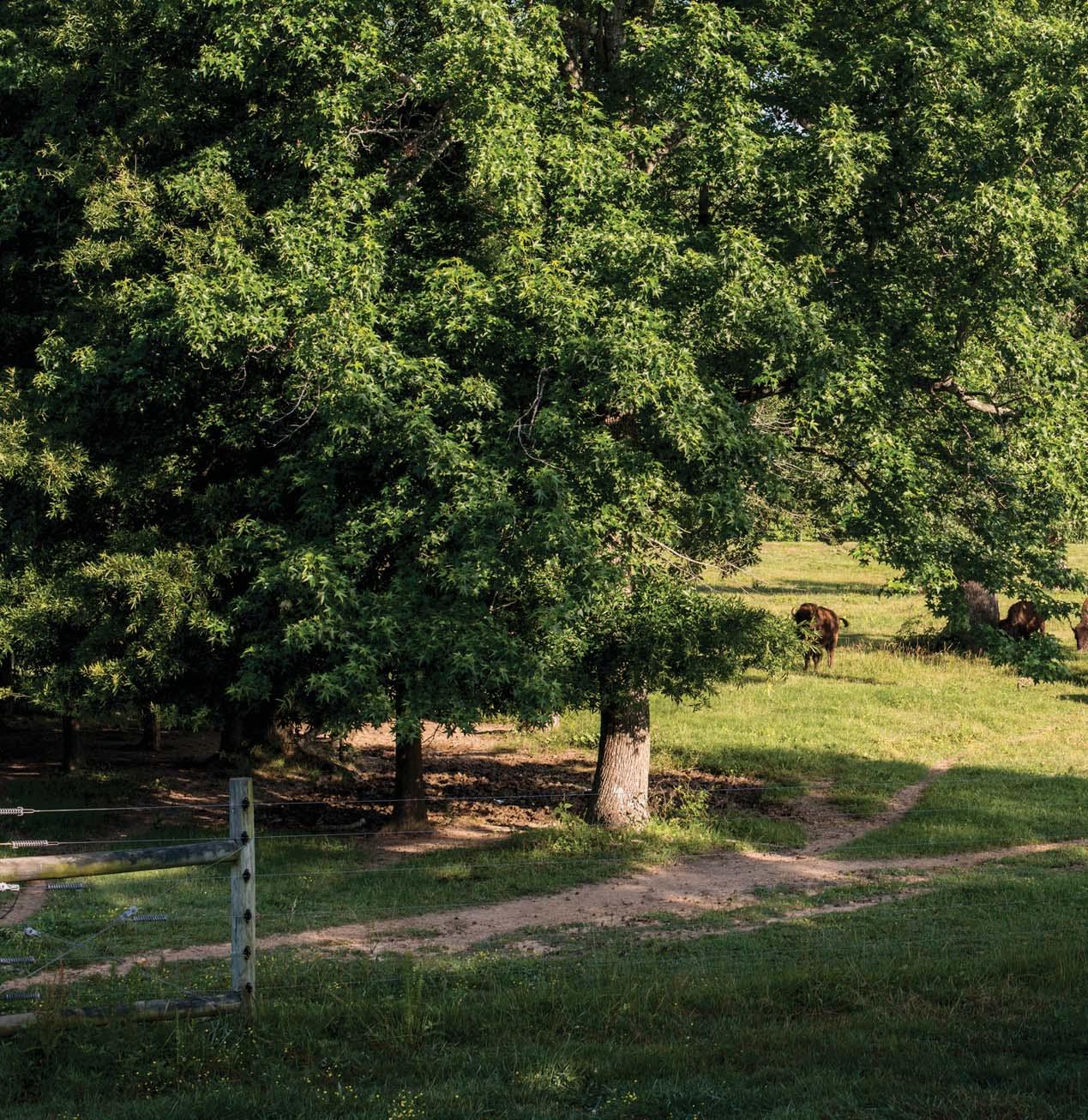
Hillsborough’s Vista Wood bison ranch
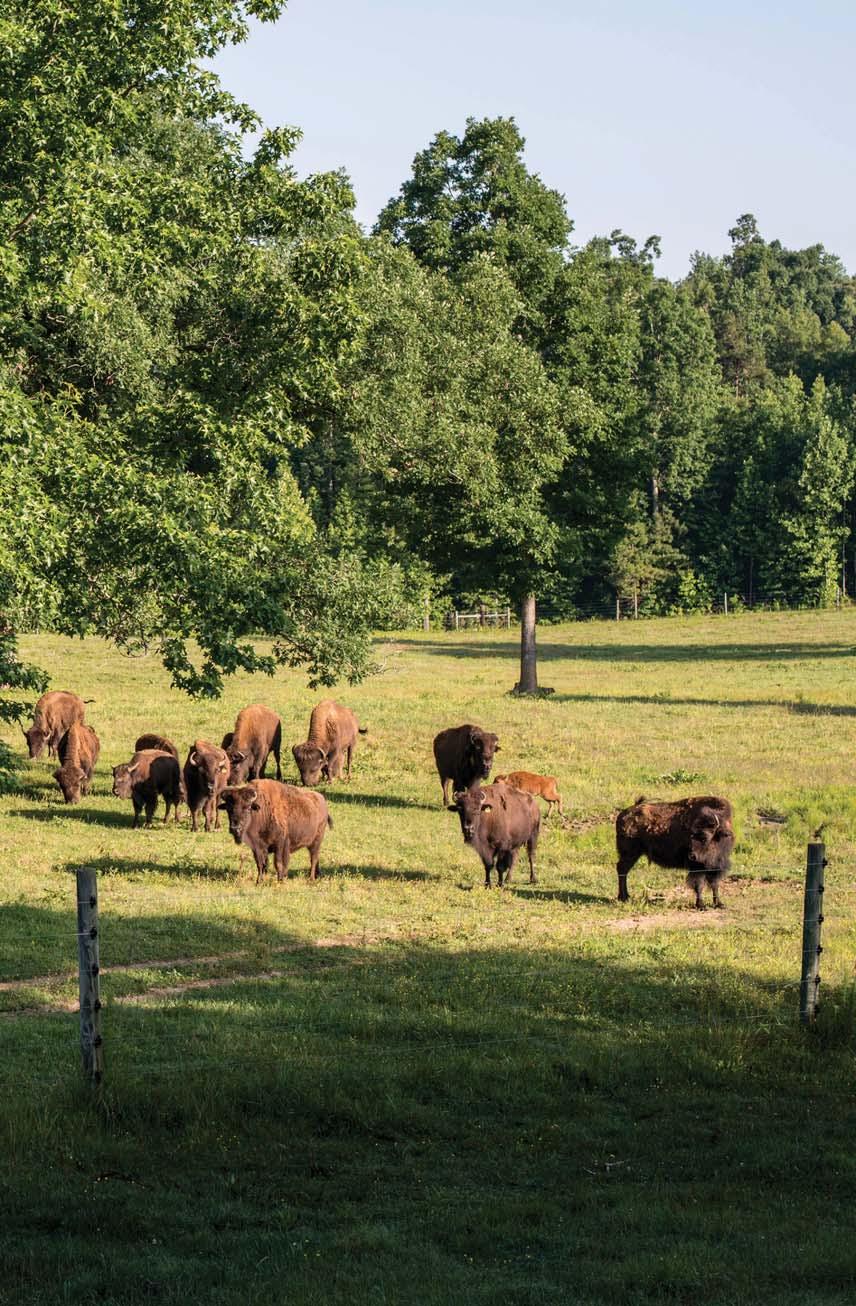
by JESSIE AMMONS
AA STONE BUFFALO STATUE GREETS visitors at the entrance to Vista Wood Ranch, which sits at a bucolic turn a few miles off of Highway 86 in Hillsborough. Then come the real thing: 15 1,000-pound furry creatures that would look right at home in an old Western movie, but they’re contentedly munching hay and meandering through green, dandelion-studded North
Carolina pastures. Then comes their doting caretaker. “We just had a baby!” shouts Jeff Peloquin. A baby buffalo was born an hour earlier, and another four are expected before summer’s over. “They take care of their own young. Don’t touch them, don’t mess with them, don’t go near them. They’ve got it covered.”
GIGS
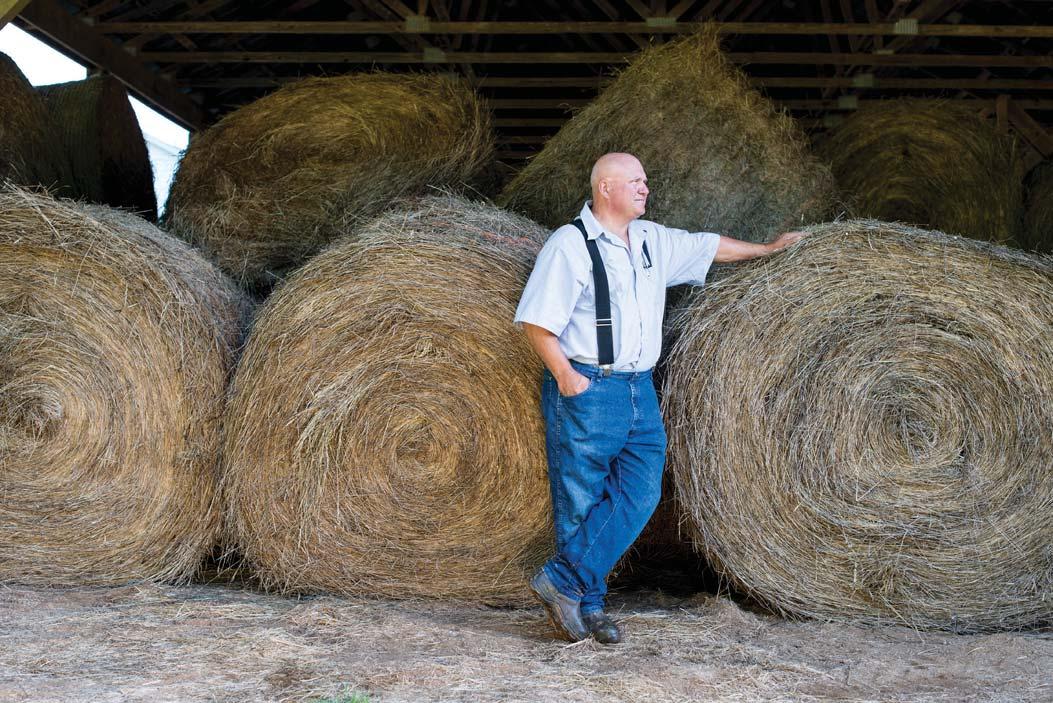
Self-sufficient describes this entire buffalo operation, a hobby for construction company owner Peloquin and his wife, Linda. The farm produces a few thousand pounds of organic buffalo (also referred to as bison) meat each year – burgers, steaks, and brats. The Peloquins make just enough to break even, Jeff Peloquin says, but they’re not in it for the profit. “This is solace.”
Vista Wood has been a long time coming for the Peloquins. The couple lived on the outskirts of Chapel Hill for decades, running a sustainable homebuilding company and dreaming of owning more land. By 2004, they were ready to move to a setting that suited their “agrarian tastes” and bought 82 acres north of Hillsborough. The property included an old rundown farmhouse and wide open spaces, and that was about it. “I knew I wanted a farm of some sort,” Peloquin says, “but I wanted to make it practical.” He wasn’t yet ready to retire, and planting and harvesting fields of produce didn’t seem realistic at his stage of life. Animals made better sense. “I wanted an animal that is very well-adapted and indigenous to North Carolina. People don’t realize it, but buffaloes are indigenous. They lived here for millions of years, from here to California, before America was settled.” Technically, these are American bison, not buffalo. True buffaloes are Asian and African members of the same animal family, but hundreds of years ago, Native Americans called these native bison “buffalo,” and the common reference has lasted. Peloquin’s interest in Native American culture led him to consider raising bison. “It was (Native Americans’) food source, their shelter source, their fuel source, their tool source. They used every component of the animal: They used the hides for clothes and shelter, the bones for tools, the fur for diapers.” It’s why, today, the animals are still “instinctively well-suited to living here. They already know what they can and can’t eat intuitively.” Most livestock require a farmer to domesticate and train them, but buffalo don’t. Self-sufficiency, Peloquin says, makes for a natural, sustainable final product. “We don’t give the herd any feed, they only eat grass and hay. We don’t give them hormone shots, we don’t give them antibiotics.” He gestures around at the 25 pastured acres, representing more than an acre per animal. “They’re clearly pasture-raised.” Thanks in part to their roaming, Vista Wood buffalo meat, depending on the cut, tastes lighter, leaner, and usually more tender than beef. Early on, the Peloquins sold their meat at a few local farmers markets, but couldn’t find a comfortable balance
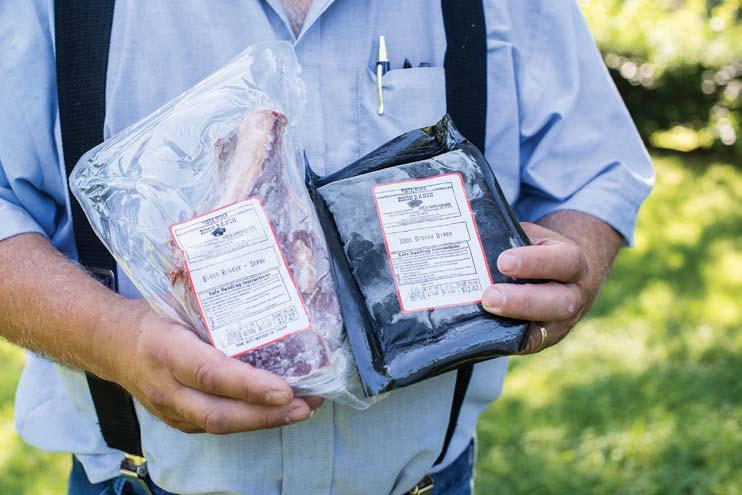
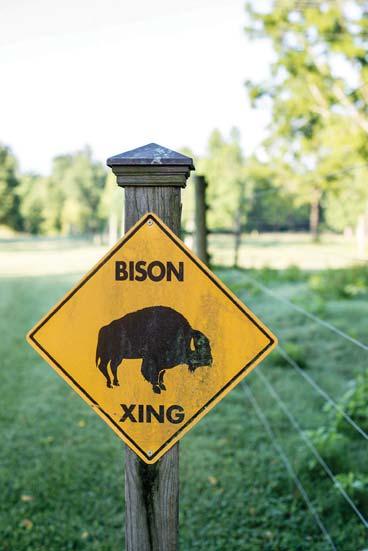
between supply and demand. “We had more customer requests than we could produce … until this becomes my full-time profession,” he says. Until then, Vista Wood buffalo cuts are available at the Hillsborough Farm and Garden center. It rarely runs out, but if you don’t find the exact type or quantity you’re looking for there, you’ll have to wait it out. As one of only a handful of buffalo producers within a fewhours’ drive, many folks believe the meat is worth the wait. Peloquin says that’s because buffalo is a source of protein people feel good about. After becoming nearly extinct in the late 1800s, bison still represent a small portion of Americans’ meat consumption. “More cattle are slaughtered in a day than bison in a year,” Peloquin says. “But most of the people that raise bison are like myself: very conscientious of the animal and their surroundings and their life. It’s not necessarily as profitable, but what’s a profit?” At Vista Wood, profit is achieved with “total harmony between animal and human and nature.” To that end, the Peloquins use other parts of the property as a wedding venue and have recently begun renting a private room out on Airbnb. Guests will likely meet one of the Peloquins’ three children: son Clint Peloquin, who ranches alongside Jeff and Linda. It’s a simple, friendly, family affair and visitors are always welcome. “We love sharing: our meat, the process,” Native American culture, and their scenic countryside spot. “The quality of life out here is high.”
vistawoodbisonranch.com
